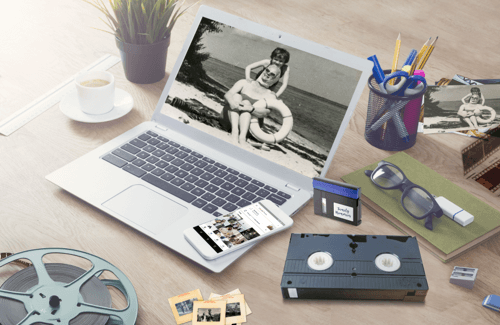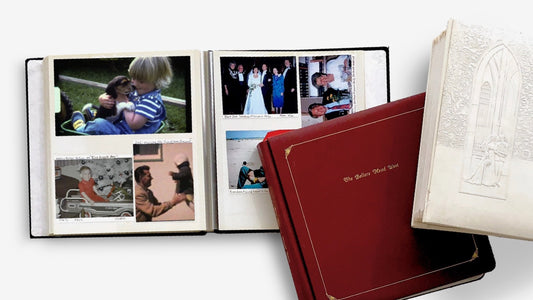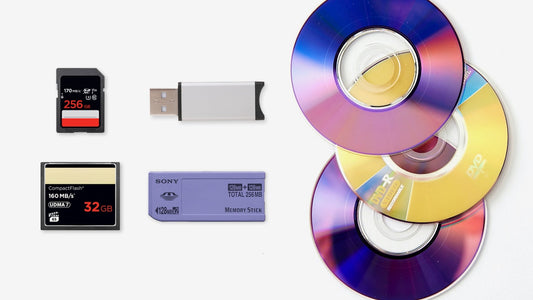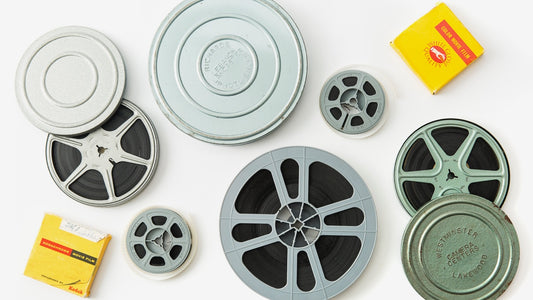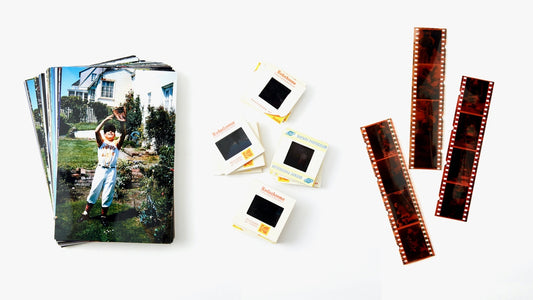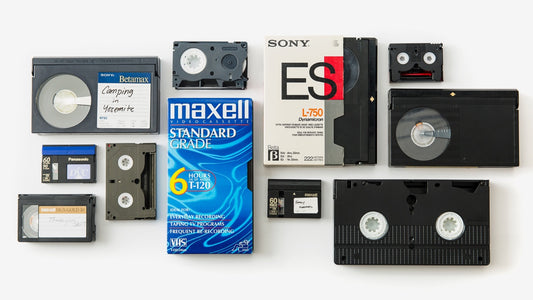When you need a few copies of a family video, your first thought might be to handle it yourself. It seems simple enough: buy some blank discs, pop them in your computer, and press "burn." But the reality can be a frustrating series of error messages, wasted discs, and hours spent troubleshooting software. Your precious memories deserve better than a stressful DIY project. Choosing a professional DVD duplication service takes all the guesswork and hassle out of the equation. You get high-quality, reliable copies without sacrificing your weekend. This guide will explore the differences between DIY and professional services, helping you understand the costs, time, and quality involved so you can make the best choice for your project.
Key Takeaways
- Understand the Right Process for Your Project: Duplication is the best choice for making a smaller number of copies—think sharing a wedding video with family. It’s a fast, affordable process that burns your video onto high-quality discs, unlike industrial replication used for mass-market DVDs.
- A Professional Service Ensures Quality and Saves Time: While you can duplicate DVDs at home, hiring a professional service prevents common issues like burn errors and guarantees a polished final product. You get access to better materials, on-disc printing, and quality control, saving you hours of potential frustration.
- Prepare Your Original and Get a Digital Backup: Your final copies will only be as good as the master file you provide, so give it a final watch-through for any errors. For the best of both worlds, choose a service that also provides a digital file, giving you a secure backup and an easy way to share your memories online.
What Is DVD Duplication?
Have you ever burned a music mix onto a CD using your computer? DVD duplication is essentially the same idea, just for video. It’s the process of taking a master DVD and copying its contents onto blank, recordable DVDs (called DVD-Rs). A laser inside a disc drive "burns" the data from your original source—whether it's a home movie, a wedding video, or a school play—onto a new disc, creating an identical copy.
This method is perfect for making a handful of copies to share with family and friends. It’s a fast, straightforward, and cost-effective way to create duplicates without needing a massive production run. Whether you want to give each of your kids a copy of old family videos or share a special event with the people who were there, duplication is the go-to solution for smaller, personal projects. It’s all about making your precious memories shareable.
How the DVD Duplication Process Works
The magic behind DVD duplication happens with a laser. The process starts with a master disc containing the video you want to copy. This master is placed into a DVD duplicator, which is essentially a tower of multiple DVD burners linked together. The data from the master disc is read and then simultaneously written, or burned, onto blank DVD-R discs.
The laser in each burner creates microscopic pits on the dye layer of the blank disc, encoding the video and audio data. Once the burning process is complete, the new DVD can be played in any standard DVD player. Because this process is relatively simple, it allows for quick turnaround times. It’s an efficient way to create a small batch of high-quality copies, ensuring everyone in the family gets their own copy of that treasured holiday movie.
Duplication vs. Replication: What's the Difference?
While the terms are often used interchangeably, duplication and replication are two very different processes. Think of it this way: duplication is like photocopying a document, while replication is like using a printing press. As we covered, duplication burns data onto a recordable disc, making it ideal for smaller orders (typically under 500 copies) or projects you need done quickly.
Replication, on the other hand, is an industrial process used for large-scale orders of 500 or more. It involves creating a "glass master" of your data, which is then used to physically stamp the information onto molten polycarbonate. This is how commercial movie and software DVDs are made. For family projects, like sharing digitized home movies from a video transfer, duplication is almost always the right choice.
What Goes Into a Quality DVD?
Not all duplicated DVDs are created equal. The final quality depends heavily on two things: the equipment used and the blank discs themselves. A professional service will use high-quality, professional-grade DVD-Rs, which have lower error rates and are more durable than the cheap discs you might find at a big-box store. This ensures your video plays smoothly without skips or freezes for years to come.
When choosing a service, don't be afraid to ask about the type of media they use. Reputable companies invest in well-maintained, top-of-the-line duplication towers to ensure every copy is a perfect match to the original. Preserving your memories is important, so ensuring they are copied onto a reliable format is a crucial step. This commitment to quality is key, whether you're duplicating DVDs or getting your old photos scanned.
How Much Does DVD Duplication Cost?
Figuring out the cost of DVD duplication isn't always straightforward because the price depends on your specific project. There’s no single price tag, but understanding the key variables can help you get a clear estimate and avoid surprises. The total cost is a mix of the physical materials, the labor involved, and any extra customizations you choose.
Most services price on a per-disc basis, and that price usually drops as your order quantity goes up. Think of it like buying in bulk at the grocery store—the more you get, the better the deal. Beyond the number of copies, factors like custom printing on the disc, the type of case you select, and the complexity of your original video file all play a role. A simple project with basic packaging will naturally cost less than a large order with full-color printed discs and custom artwork inserts. The best approach is to have your project details ready and ask for a specific quote.
Factors That Determine the Price
The final price for your DVD duplication project comes down to a few key details. First is the quantity—the more copies you need, the lower the price per disc will be. Next is the type of disc itself. A standard DVD holds about two hours of video, but if your home movie is longer, you might need a dual-layer DVD, which costs a bit more. The size of your digital file is a big factor here; a larger file requiring a higher-capacity disc will affect the production costs. Customization also adds to the price. Do you want black text printed on the disc, or a full-color photo? And what about packaging? A simple paper sleeve is the most affordable option, while a standard DVD case with a printed insert will increase the cost.
Saving Money with Bulk Orders
If you’re planning to share a family wedding video with all your relatives or create copies of a school play for every parent, ordering in bulk is your best friend. Duplication services are built on the principle of economies of scale. The initial setup takes the same amount of time whether you’re making 10 copies or 100, so the more that setup cost is spread out, the lower the price per disc. This makes professional duplication services incredibly convenient. Instead of spending hours burning discs one by one on your home computer, you can simply provide them with your master disc or file and let them handle the rest.
Hidden Costs to Watch Out For
When comparing prices, make sure you’re looking at the full picture to avoid unexpected fees. Some companies might advertise a very low per-disc price but then add on charges for setup, file conversion, or proofing. Always ask for an all-inclusive quote. Another thing to consider is the quality of your master copy. If your file is corrupted or your original disc has errors, you may be charged for the time it takes to fix it before the duplication can begin. Shipping is another area to watch; be sure to factor in the cost of safely getting your master to the company and having the final copies delivered to you. Finally, be wary of services that seem too cheap to be true, as they may cut corners on quality control, leaving you with faulty discs.
Making Your DVDs Your Own: Customization Options
Duplicating your DVDs is about more than just making a functional copy; it’s an opportunity to create a polished, personal keepsake. Whether you’re sharing treasured family videos from a wedding or creating a professional portfolio of your work, the small details can make a big difference. Customization options turn a simple disc into a complete, thoughtful package that looks great on a shelf and is easy to identify.
From the design printed on the disc itself to the case it comes in, you have control over the final look and feel. These finishing touches not only add a professional flair but also help protect your memories for years to come. Plus, many services now offer digital files alongside your physical copies, giving you the best of both worlds for preserving and sharing your content. Let’s walk through the most common ways you can personalize your duplicated DVDs.
Printing Directly on Your Discs
Forget about those sticky paper labels that can peel, bubble, or even jam a DVD player. Professional duplication services offer high-quality printing directly onto the surface of the disc. This gives your project a clean, seamless look that you just can’t get at home. You can add a title, a special date, or even a full-color photo to make each disc instantly recognizable. Beyond looking great, this process also adds a layer of protection. A professionally printed surface can help shield your DVD from the minor scratches, smudges, and fading that happen over time, ensuring your memories stay safe.
Choosing Your DVD Case and Artwork
The case is the first thing anyone will see, and it does the important job of protecting your disc from dust and damage. You have plenty of packaging options to choose from, ranging from simple, clear jewel cases to classic black DVD cases with a clear sleeve for artwork. Creating custom artwork for the case insert is where you can really bring your project to life. You can design a cover with a favorite photo, a title, and a list of the contents or "chapters" inside. This turns a simple disc into a beautiful, easy-to-navigate library of memories, perfect for gifting or archiving your family’s history.
Getting a Digital Copy, Too
In an increasingly digital world, having a physical DVD is wonderful, but having a digital backup is essential. Many duplication services now offer the option to receive a digital file of your video content along with your physical discs. This is a fantastic feature for a few key reasons. First, it’s the ultimate backup—if anything ever happens to your DVDs, your memories are safe on a computer or in the cloud. Second, it makes sharing a breeze. You can easily email a file to a relative across the country or upload it to a private social media group for the whole family to enjoy. Services like YesVideo specialize in video transfer to digital, ensuring your memories are preserved and accessible for generations.
How to Choose the Right DVD Duplication Service
Picking a DVD duplication service can feel like a big decision, especially when you’re trusting someone with irreplaceable memories. You want a partner who will treat your project with the same care you would. The right service combines technical skill with a genuine respect for your originals. To find a company you can rely on, it helps to look at a few key areas: the quality of their materials, the technology they use, how they protect your media, and the logistics of getting your project done.
Signs of a High-Quality Service
A reputable service is always transparent about the materials they use. Don’t hesitate to ask about the quality of their blank DVDs. Top-tier companies use discs with low error rates to ensure your duplicated copies play smoothly without any glitches or freezes. Another clear sign of quality is straightforward communication. Look for a company with positive customer reviews, clear pricing without hidden fees, and a support team that’s happy to answer your questions. They should make you feel confident and informed every step of the way, showing they value both your business and the memories you’re preserving.
Confirming Their Technical Capabilities
The best duplication services use advanced technology to guarantee every copy is perfect. Many professionals use a process called automated optical inspection, where specialized equipment scans each disc for physical defects or inconsistencies that the human eye might miss. This quality control step ensures that the final product is a flawless replica of your original. When you’re researching services, look for mentions of their quality checks and the professional-grade equipment they use. This attention to detail is what separates an amateur job from a professional video transfer that will last for years to come.
How They Protect Your Memories and Offer Support
Your memories are precious, and a good duplication service understands that. Many modern services can create duplicates from a digital file of your original DVD, meaning you don’t have to risk sending your only copy through the mail. Beyond just making copies, leading services offer ways to make your memories more accessible. For example, YesVideo includes MemoryCloud access, allowing you to view, download, and share your digitized videos and photos online. This combination of physical and digital media transfer options gives you peace of mind and more ways to enjoy your favorite moments with family and friends.
Location and Shipping Considerations
Where a company is located can make a real difference. Choosing a service that processes orders in your own country, like here in the USA, often means faster turnaround times and more reliable customer support. It also simplifies the shipping process and reduces the risk of your package getting lost. Before you send anything, confirm their shipping policies and how they handle original materials. It’s also a good idea to double-check your master disc for any errors. Providing a clean, error-free original helps the duplication service create the best possible copies for you.
Working with a Professional DVD Duplication Service
Choosing a professional service means you’re putting your memories in someone else’s hands, so it’s important to find a partner you can trust. A good company will not only deliver high-quality copies but also handle your original materials with the utmost care. They should have a clear process, transparent pricing, and a team that understands the sentimental value of your project. Think of it as finding a temporary guardian for your family’s history. You want someone who will treat your home movies and films as if they were their own.
How YesVideo Can Help
While traditional duplication services simply copy existing DVDs, we specialize in the step before that: turning your original home movies into digital files. If your goal is to preserve and share old memories, our video transfer service is the perfect starting point. We carefully digitize your videotapes, film reels, and photos by hand. Once your memories are digitized, you get access to them on our MemoryCloud, where you can view, download, and share them directly to platforms like Google Photos. From there, you can easily create your own DVDs or simply enjoy the flexibility of having your memories safe in a digital format.
What Are the Industry Standards?
The quality of a duplicated DVD depends entirely on the process and materials used. Professional services should use high-grade, low-error-rate discs to ensure your videos play smoothly for years to come. The process itself, known as DVD replication, involves several technical steps that can affect the final product's quality. A reputable company will have strict quality control checks to catch any issues before the discs are sent to you. They should be able to guarantee that each copy is a perfect match to the original, with no data loss, pixelation, or audio glitches.
How to Compare Different Services
When you’re looking for the right service, it’s smart to compare a few key things. First, ask about the quality of the blank media they use—you don’t want a company that cuts corners to save a few pennies. Next, look at their on-disc printing and packaging options to see if they match your vision. Finally, check their standard turnaround times and what they offer for support. A reliable provider will be transparent about their process and have a solid track record. Reading customer reviews can also give you a great sense of their performance and how they handle precious photo albums and tapes.
Why People Duplicate DVDs
DVD duplication serves a surprisingly wide range of purposes, from professional projects to deeply personal ones. It’s a straightforward way to create multiple physical copies of a single master disc, allowing you to share your content, preserve it for the future, or distribute it professionally. While it might seem a bit old-school, creating physical copies remains a reliable and meaningful way to share important videos. Here are some of the most common reasons people choose to duplicate their DVDs.
For Business and Marketing
For businesses, a professionally duplicated DVD can be a powerful marketing tool. It’s a tangible way to present promotional materials, training videos, or product demonstrations that leaves a lasting impression. Imagine handing a potential client a high-quality DVD of your company’s work instead of just sending a link. This approach adds a level of professionalism and ensures your materials are presented exactly as you intended. It’s also perfect for distributing internal training content to new employees, guaranteeing everyone has access to the same information, regardless of their internet connection.
For Sharing Educational Content
Educators and trainers often use DVD duplication to distribute course materials, lectures, and instructional videos. This method is incredibly useful for making learning resources accessible to everyone. Not all students or trainees have reliable, high-speed internet, and a DVD provides a simple, offline alternative. Whether it’s a series of lectures for a college course, a set of how-to videos for a workshop, or language-learning modules, duplicated DVDs ensure that valuable educational content can be easily shared and reviewed by anyone, anytime. It’s a practical solution that bridges the digital divide.
For Family Projects and Special Events
This is where duplication gets personal. After you’ve taken the time to transfer your videos to a digital format, creating DVD copies is the perfect way to share those memories. Think of it as creating a treasured keepsake for your loved ones. A DVD of a wedding, a milestone birthday, or a family reunion makes a wonderful, heartfelt gift. It’s something your relatives can hold in their hands and watch easily, especially older family members who might not be comfortable with digital files and streaming links. It’s about sharing the joy in a tangible, lasting way.
For Archiving and Preserving Memories
One of the most important reasons to duplicate a DVD is for simple peace of mind. Technology fails, and digital files can get corrupted or lost. Having multiple physical copies of your most precious memories is a smart backup strategy. By creating duplicates of your digitized home movies or scanned photo albums, you’re creating an archive. You can store one copy at home and give another to a relative or keep it in a safe deposit box. This ensures that your family’s legacy—those irreplaceable moments—is protected and can be passed down to future generations.
Getting the Technical Details Right
When you’re focused on the memories you want to preserve, the technical side of DVD duplication can feel a little overwhelming. But getting a few key details right from the start is what ensures your final DVDs look and sound exactly how you want them to. Think of it as setting the foundation for a project you’ll cherish for years. It’s all about making sure your precious memories are handled correctly from the moment you send them in.
A professional service will guide you through these steps, but knowing what to look for helps you make informed decisions and ensures a smooth process. From file types to quality checks, a little preparation goes a long way in creating the perfect keepsake.
Making Sure Your Files Are Compatible
Before a duplication service can work its magic, they need to be able to read your files. Compatibility simply means that the format of your video is one their equipment can work with. Sending a file type they can’t use can lead to delays and even extra costs. If you’re starting with digital files, it’s always a good idea to ask the service which formats they prefer.
If your memories are still on old tapes or film reels, you don’t have to worry about this step. A full-service company can handle the video transfer for you, converting your analog memories into a high-quality digital format that’s perfect for duplication. This takes the guesswork out of the equation and ensures your project starts on the right foot.
How to Prepare Your Files for Duplication
Once you have your master file, give it one final watch-through before sending it off for duplication. It’s your responsibility to make sure the content you provide is free of any errors. Check for any glitches, audio dropouts, or anything else that seems out of place. Is the video edited exactly how you want it? Are the chapter markers where they should be?
Catching a mistake at this stage is much easier than trying to fix it after 50 copies have already been made. This simple quality check on your end ensures the final product is a perfect reflection of your vision and saves you from any potential disappointment down the road.
A Quick Note on Copyright
It’s important to remember that professional duplication services are intended for content that you own. This means home movies, wedding videos, school plays, and other personal recordings are perfect candidates. However, you cannot legally duplicate copyrighted material like commercial movies, TV shows, or any other content you didn’t create yourself.
Reputable companies will not reproduce copyrighted material, as it violates the law. This policy protects both you and the business. So, as you gather your memories for a project, just make sure you have the rights to everything you plan to copy. This ensures your project is all about celebrating your own unique story.
How Pros Check for Quality
What separates a professional service from a DIY job is the rigorous quality control process. Professionals understand that creating a perfect DVD involves more than just clicking "burn." They run multiple checks to prevent errors and ensure every single copy is as good as the original. This process often includes verifying the master disc for any flaws before duplication begins and spot-checking the finished DVDs to confirm they play perfectly.
This attention to detail is crucial for delivering a reliable, high-quality product. When you trust a service with your memories, you’re also trusting their process. That’s why at YesVideo, every order is processed by hand, ensuring your precious home movies and photos receive the care they deserve.
Should You DIY or Hire a Pro?
Deciding whether to duplicate your DVDs yourself or hand the project over to a professional service comes down to a few key things: your budget, your timeline, and how much hands-on work you’re willing to do. Going the DIY route gives you complete control over the process, which can be appealing for smaller projects. You get to pick the software, choose the discs, and work at your own pace.
On the other hand, professional services are designed for convenience and quality assurance, especially when you need multiple copies. As one expert notes, "Duplication services can be convenient when you don't have time to fuss with doing it yourself." When you’re preserving precious family videos or creating DVDs for a special event, hiring a pro means you’re paying for expertise and peace of mind. They have the right equipment and streamlined processes to deliver high-quality, consistent results without the technical headaches. For many, the time saved and the guarantee of a professional product make it the clear choice for important video transfer projects. Before you decide, let’s break down what each path really involves in terms of equipment, cost, and time.
What Equipment Do You Need for DIY?
If you decide to duplicate your DVDs at home, you’ll need more than just a stack of blank discs. Your essential toolkit includes a reliable computer with a built-in or external DVD burner, which will be the workhorse of your project. You'll also need DVD duplication software to manage the copying process; while some basic options are available for free, more advanced programs that offer better quality control and features often come with a price tag. Of course, you’ll need high-quality blank DVDs—skimping here can lead to failed copies, often called "coasters." If you want your discs to look polished, you’ll also need a printer that can print directly onto discs or on adhesive labels, along with the corresponding supplies.
Comparing the Costs: DIY vs. Pro
At first glance, DIY might seem like the cheaper option, but it’s important to look at the full picture. For a DIY project, you have to factor in the cost of blank DVDs, software, and any hardware you might need to purchase. There are also hidden costs, like the price of wasted discs from burn errors or the ink for printing labels. For just a few copies, this might be manageable. Professional services offer straightforward, per-disc pricing that often gets cheaper with bulk orders. You know exactly what you’ll pay upfront. As professionals note, complexities like needing a dual-layer DVD can affect production costs, something a pro service is equipped to handle seamlessly. With a service, you’re not just paying for a disc; you’re paying for quality materials and expert oversight.
How Much Time Will Each Option Take?
The biggest hidden cost of a DIY project is often your time. The process isn't just about the few minutes it takes to burn a single disc. You have to account for setting up your computer, learning the software, troubleshooting inevitable errors, and designing and printing labels. If you’re making dozens of copies, this can easily turn into a multi-day project. Hiring a professional service transforms the process. Your main job is to provide the master copy; the experts handle the rest. The process of DVD duplication can be filled with "technical hurdles that can affect the quality," but professionals have systems to avoid these pitfalls. This efficiency not only saves you hours of potential frustration but also ensures you get high-quality, working DVDs delivered on a predictable schedule.
How Long Does It Take to Get Your DVDs?
You’ve sent your memories off to be duplicated, and now you’re eagerly awaiting their return. The total time depends on two key things: how long the company takes to produce your discs and how long it takes to ship them back. Understanding this timeline helps you plan, especially if you’re working toward a deadline for a gift or a special event. Let’s break down what you can expect so you know exactly what’s happening with your project from start to finish.
Standard Turnaround Times
Most professional services provide an estimated production time. This is how long they need to duplicate your content, print your labels, and assemble your packaging. At YesVideo, the average order takes about 3-4 weeks from the moment we receive it. It’s important to clarify whether the date you’re given is when your order is finished or when it will ship. Often, an "estimated ship date" is when your order is ready to leave the facility, not when it will land on your doorstep. The complexity of your order, like custom artwork, can also influence this timeline.
Need It Faster? Rush Order Options
If you’re in a pinch, many companies offer rush processing for an additional fee. This can shorten the production time to just a few business days—perfect for last-minute gifts or urgent projects. However, keep in mind that rush orders can sometimes come with limitations. For example, certain complex packaging options might not be available on an accelerated timeline. If you’re considering a rush order, just be sure to ask what’s included and confirm that the service can meet your specific deadline without compromising the quality of your project.
Understanding Shipping and Handling
Once your DVDs are ready, the final step is getting them home. This is where shipping time comes in, and it’s completely separate from production. The shipping method you choose—whether standard or expedited—will determine how quickly your package arrives after it leaves the facility. When you’re dealing with irreplaceable memories, you also want to ensure the service uses secure, trackable shipping. We provide a crush-proof box and a pre-paid shipping label to make sure your originals get to us safely, and we take the same care when sending everything back to you.
Related Articles
- 4 Easy Ways to Convert VHS to DVD at Home – YesVideo
- Convert VHS Tapes to DVD: The Ultimate 2025 Guide – YesVideo
- 8 Best VHS to Digital Services Reviewed – YesVideo
- VHS Conversion to Digital: A Complete Guide – YesVideo
- Transfer VHS to DVD: DIY or Pro - Which is Best? – YesVideo
Frequently Asked Questions
My home movies are still on VHS tapes. Can you duplicate those? That's a great question and a very common starting point. DVD duplication requires a digital source file or a master DVD to copy from. So, before you can make copies, your VHS tapes first need to be converted into a digital format. This is the essential first step, and it's exactly what services like YesVideo specialize in. We carefully transfer your tapes to a digital file, preserving them safely before you decide to create physical DVD copies to share.
What's the real difference between duplicating and replicating a DVD? Think of it like this: duplication is like burning a mix CD on your computer, while replication is like a professional printing press for discs. Duplication burns your video data onto a blank, recordable DVD, which is perfect for smaller batches of under 500 copies. Replication physically stamps the data into the disc during manufacturing, a method used for massive orders like Hollywood movies. For personal projects like sharing family videos, duplication is almost always the right choice.
Can I make copies of my favorite Hollywood movie? The short answer is no. Professional duplication services can only copy content that you personally own the rights to. This includes your own home movies, wedding videos, school plays, or any other video you created yourself. Copying commercially produced movies or TV shows is a violation of copyright law, and reputable companies will not fulfill these requests. The service is designed to help you share your personal memories, not copyrighted media.
Is it really cheaper to duplicate DVDs myself? While it might seem less expensive on the surface, the costs of a DIY project can add up quickly. You have to account for the price of quality blank discs, burning software, and the time it takes to troubleshoot errors and burn each copy one by one. Failed burns create wasted discs, or "coasters." When you hire a professional, you're paying a straightforward price for their expertise, high-grade materials, and quality control, which saves you a lot of time and potential frustration.
How can I make sure my duplicated DVDs will last a long time? The longevity of a duplicated DVD comes down to the quality of the physical disc it's burned on. A professional service will use high-quality, archival-grade DVD-Rs that are designed to resist data loss and physical wear over many years. These are far more reliable than the cheap spindles of discs you might find at a big-box store. Choosing a service that invests in top-tier media is the best way to ensure your cherished memories are preserved for the future.





